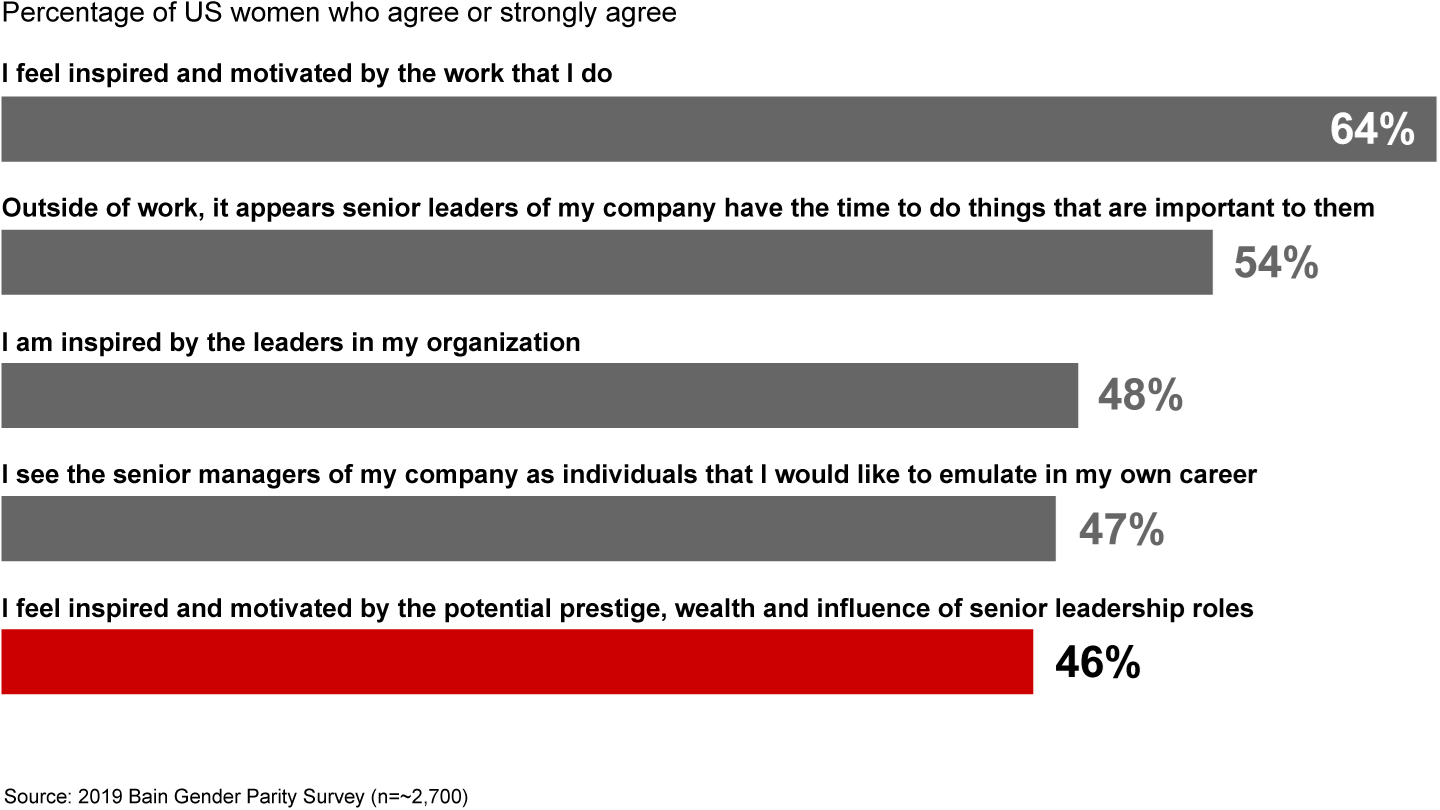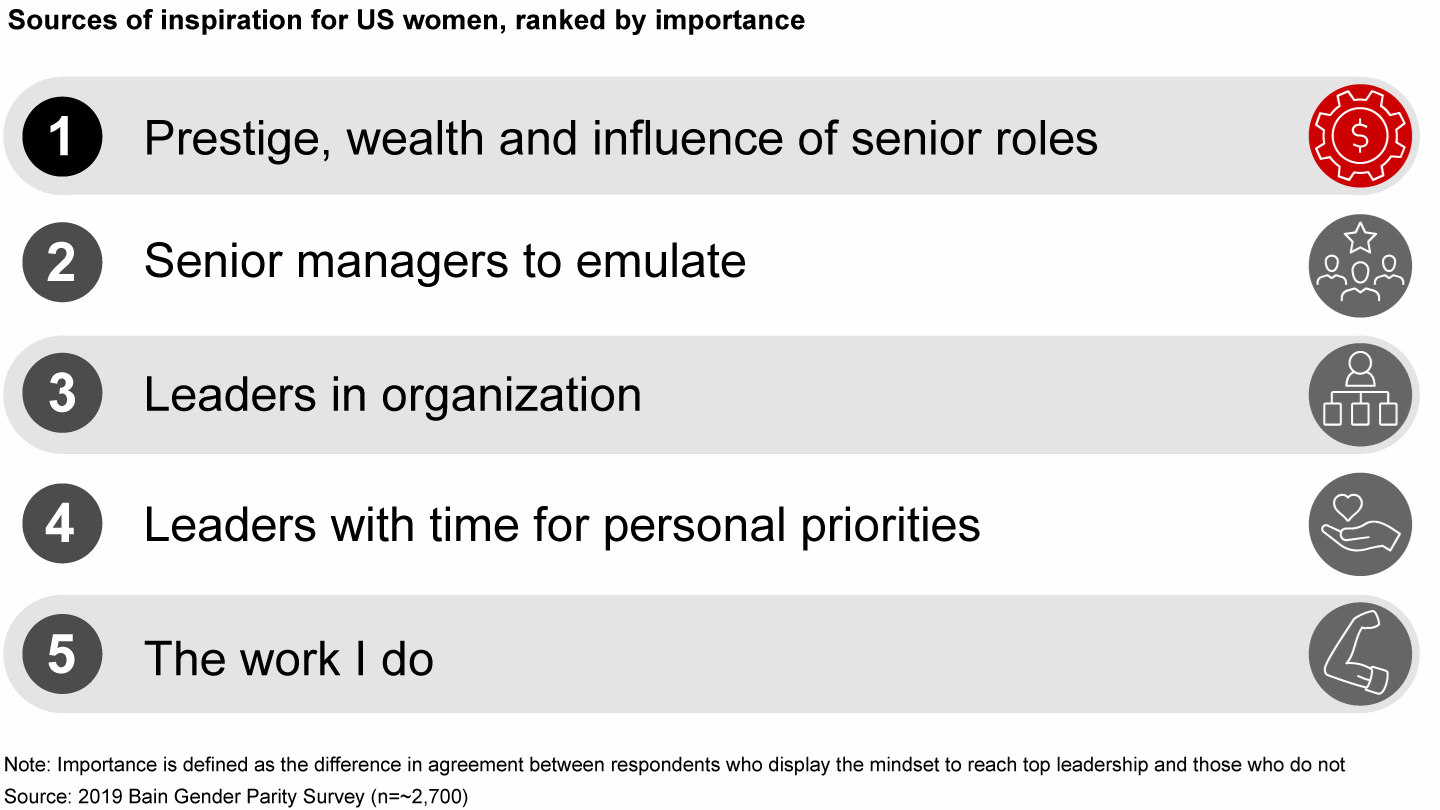Brief

Auf einen Blick
- Less than half of women surveyed in the US say they currently feel inspired and motivated by the potential prestige, wealth and influence of senior leadership positions, but our research shows that this factor is actually the most important to their reaching those roles.
- Companies and candidates themselves can begin to change that by talking more openly about things like compensation and impact, and by taking a few other key actions.
Kathy Waller was a young manager when she went to lunch with her supervisor one day. The two hadn’t connected much, and this lunch was unusual. Even so, sitting across the table from him, she decided to bring up a job she’d seen posted. It was the director of financial reporting position, which offered a higher level of responsibility than her current role. Waller really wanted it, but she’d heard rumors that a half dozen people were already in line. “What would it take for me to be considered for that job in the future?” she asked. “Because I am really interested.”
In response, Waller remembers, her supervisor put his fork down, stared at her and said, “I never thought that would be something you’d be interested in.”
Weeks later, she had the job. “If I hadn’t said something to him in that happenchance meeting, I never would have gotten the job that I really wanted, a job that changed the trajectory of my career,” she says. That trajectory eventually led to the C-suite of one of the largest companies in the world. In 2019, after 32 years at Coca-Cola, Waller retired as CFO, the first female and first African American chief financial officer of a Fortune 100 company.
In this excerpt from her conversation with Bain's Jennifer Hayes, Kathy Waller explains how her executive role at Coca-Cola allowed her to effect positive change and give back to the causes she holds dear. Watch the full conversation.
Waller’s story reflects a consistent finding of Bain & Company’s ongoing research into gender parity and women’s career advancement: Reaching a senior level in any organization requires not just the right skill set, but also the right mindset. Candidates must have both the aspiration to reach senior leadership and the confidence to do so. The challenge is creating an atmosphere that supports men and women equally in developing those qualities.
Working with Dynata, a leading data provider, we surveyed approximately 12,000 men and women and conducted in-depth, follow-on interviews with executive women around the world about various factors that can affect this critical leadership mindset. We targeted individuals at large corporations who were on a management track with their current employer.
We analyzed the factors that influence whether employees are open to and ready for senior leadership roles. Feeling empowered, supported and capable were all important, but feeling inspired stood out as the key ingredient. In fact, those who feel inspired—whether male or female—are more than twice as likely to have the senior leadership mindset.
The inspiration gap
Understanding the critical factors that inspire women is the first step to creating a work environment in which they thrive. Today, only 46% of the US women we surveyed feel inspired by the prestige, wealth and influence that senior-level positions offer—less than any other source of inspiration we asked about (see Figure 1).
Only 46% of women say they feel inspired by the potential prestige, wealth and influence of senior leadership roles


Yet, as our research shows, this factor is actually the most important for helping women get to senior leadership (see Figure 2).
Our research shows that prestige, wealth and influence is the key factor in helping women reach senior leadership


Not only is prestige, wealth and influence the most important for American women, it is more important for women than it is for men. Still, men are more likely than women to say they are inspired by this factor day in and day out.
Companies looking to diversify their leadership miss a large opportunity if they don’t begin to address this with women as directly as they do with men rising through the ranks.
Prestige, wealth and influence: Women need to know they can have it
So why aren’t we talking more about prestige, wealth and influence? Why aren’t we helping women tap into this source of inspiration in the workplace?
Gender stereotypes may play a role. Historically, women have been given the message that wanting money and power is unfeminine. Culturally, they’ve been told this is inappropriate to discuss. However, our interviews with successful executive women uncovered several themes that challenged this idea and reframed the conversation.
First, many female executives emphasized that women should be comfortable talking about money and power. Regardless of gender, serving in the C-suite demands considerable energy and time. That effort and sacrifice deserve to be compensated accordingly, they said. One executive noted that pay and title are often the most explicit signals of value in an organization. Women shouldn’t hesitate to talk about the prestige, wealth and influence that comes with senior roles, and why they want it.
Many women’s view of “prestige, wealth and influence” extends well beyond money or status. For them, it is about the potential for impact. “The topic is taboo,” one female director at a professional services firm acknowledged, “but the truth is wealth and power allow you to have more impact and influence than you would otherwise. It doesn’t necessarily need to be about you; it can also be for people, topics or causes you care about.”
In our interviews, female executives spoke about being able to support causes they are passionate about, both within their organizations and outside of them. Many shared specific examples from their lives, such as helping to advance other women in their organizations, providing for their families and contributing to relatives’ higher education.
These themes resonated with Coca-Cola’s Waller. She recognized that the larger roles she took required trade-offs and that the compensation should be commensurate. She also saw the opportunity a senior leadership role would give her to have an impact on issues and organizations she cared about. Climbing the ranks unlocked new levels and avenues of influence, bolstering her work to support and promote gender and racial diversity on Coca-Cola’s Women’s Leadership Council, as well as outside the company on nonprofit and university boards. The prestige of the CFO position amplified her impact in a way that she says might otherwise not have been possible.
Bridging the gap: How companies can take action
Inspiration is critical to reaching senior leadership, and women are less inspired than their male counterparts on every factor we examined. In the US, it’s vital that women see and understand the power, wealth and influence that comes with senior roles. Our research points to three actions that companies and managers—male and female—can take to help address this inspiration gap and support women climbing the ranks.
Proactively share the full value proposition. Women need to understand the tangible benefits of reaching top leadership, as well as the value and impact they can have in senior roles. They also need to know that talking about these topics is acceptable. Companies should:
- Clearly communicate and be transparent about the benefits of senior roles. These benefits are not always evident to women still building their careers. And, as our research shows, the idea that these topics are not important to women is simply wrong. They are.
- Cover the financial benefits, as well as the opportunities for influence and impact both inside the company and beyond, including roles on boards or other involvement with outside organizations.
Show clear paths to leadership. To ensure that women see a route they can travel to senior management, companies should:
- Create opportunities for junior women to share their aspirations, and help them identify the steps and paths they can take to get there.
- Sponsor women to take on roles with more visibility and power.
Ensure that role models are visible. Highlight individuals who exemplify different models of success and provide a holistic view of these leaders, both professionally and personally. Companies should:
- Celebrate different models of leadership, such as exceptional coaches and sponsors.
- Break down stereotypes, including the idea that women shouldn’t want these roles for the same reason men do. Have senior women, coaches and mentors talk about this candidly.
While prestige, power and influence were particularly important to American women, our research found that their counterparts in China and Germany responded more to inspirational leadership, and those in India to work-life balance. Keeping women’s unique context in mind and tailoring initiatives accordingly is imperative.
Bridging the gap: What women need to do
By taking the time to understand what inspires their female employees, companies will help women thrive and push their organizations a step closer to gender equality. We, as women, also need to play a role by focusing on a few key actions.
Ask for what you want. Think about where you want to be professionally and personally in the next one, three and five years, and talk about your expectations with managers and human resources. What do you need to thrive in your current career? What are you building toward, and whose help do you need to get there?
Understand your value, and get comfortable talking about compensation. Use resources at your disposal (peers, sponsors, managers, network, recruiters) to understand compensation in your field and how yours compares to that of similar professionals. How does your compensation measure up, and what is the trajectory you should expect?
Know how you fit into succession plans. Work with sponsors and managers to understand the succession plans for roles that interest you and whether you are among those being considered. Are you in the running for the positions you want now and one to three years from now? If not, what gaps do you need to fill, and how will you demonstrate that you have filled them?
While organizations must continue to find ways to help employees thrive, it is critical that candidates advocate for themselves as well, as Kathy Waller did at lunch that day. Doing so may feel uncomfortable, but that probably means you’re on the right track. Closing the gender gap in senior leadership is a complex undertaking, and it won’t happen without effort from companies and individuals alike.
Jennifer Hayes is chair of Bain & Company’s Global Women’s Leadership Council (GWLC) and a partner in the firm’s Atlanta office. Melissa Artabane is Bain’s director of diversity and inclusion and is based in the Boston office. Brittany Martin is the senior manager of the GWLC and is based in the Los Angeles office.
The authors would like to thank Sarah Finley, Mia Sobin and Sophie Truscott for their contributions to this brief.

About the Research
Data powered by Dynata, a leading global first-party data and insights platform.